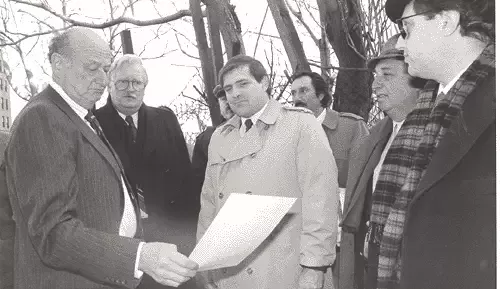HeroVet: Al Peck

On Veterans Day in 1987, the City of New York opened a new, 400-bed shelter for the homeless in a converted belt and pocketbook factory in Queens. What made this facility different from others scattered across the five boroughs was its clientele: to be admitted to the Borden Avenue Veterans Residence, a man had to have served in the Armed Forces. This was a condition imposed by the community and agreed to by the city, which wanted to site a shelter in the solid, lower middle class community of Long Island City.
At that time in New York, the plight of the homeless was an ongoing public issue, garnering intensive media attention. Thousands of unkempt, bedraggled men, and not a few women, wandered about the city, panhandling, sleeping in the subways and begging commuters for handouts at the bus stations and railroad terminals. Advocates railed against the warehousing of the homeless in shelters inadequate to meet their needs and bemoaned the lack of affordable housing. Beleaguered administrators seemed dismayed as much by the criticism and invective hurled at them as by the scope of the problem.
In this atmosphere, everyone wanted Borden Avenue, as it quickly came to be known, to succeed. The efforts of one man essentially made it so: Al Peck.
Encouraged by the Mayor’s Office – encouraged by Mayor Ed Koch himself – the Salvation Army, which operated Borden Avenue under contract with the city, advertised for a new shelter director. They sought someone who had a master’s degree, who had worked with veterans, who had experience with drug and alcohol addiction, and who had run in-patient programs.
The job description seemed tailored for Al Peck.
Gaining Insight
For a dozen years, Al had been the executive director of a drug and alcohol family counseling center on Long Island. In the early 80’s, he perceived the need and founded the Vietnam Veterans Resource Center in Hicksville. There, he became one of the first to successfully bill the government for post-traumatic stress disorder counseling.
He tells this story: “One day, a guy jumps out of a dumpster and tries to stab me with a bayonet in a weak attempt to rob me. Once I subdued him – he was emaciated and I’m not exactly a small guy – I took him to the counseling center. Through him I came to the realization that a lot of the homeless were veterans, a lot of the veterans were suffering from PTSD, and many of them just weren’t coping very well.”
Later on, he came to another understanding as well: War effects people profoundly. Those affected the most, however, talk about it the least.
Al sought funding, and local chapters of the American Legion, Veterans of Foreign Wars, and Vietnam Veterans of America came through. So did Long Island-born singer-songwriter Billy Joel, through his Charity Begins at Home foundation. For scores of veterans and their families over the next several years, the Resource Center was a beacon of hope, a place where they could find compassion and assistance and learn to deal with the demons that were haunting them – to a great extent because of the vision and understanding of Al Peck.
Search and Avoid
Al, who grew up on Long Island, attended Pennsylvania Military College in Chester, Pennsylvania, not far from Philadelphia. He graduated in 1968 with second lieutenant’s bars, entered the Army, and in October 1969, two months’ married, was sent to Vietnam.
Assigned to the 9th Infantry Division, then under the operational control of the 25th Infantry, he was, he says, one of the few platoon leaders who happened to be an officer. Operating out of Ben Luc, in IV Corps, “we were fairly good at figuring out where the enemy was, where there were booby traps, and trying to avoid them,” Al says. This was a time when a lot of platoon leaders didn’t go out of their way to pursue an elusive enemy – and take unnecessary casualties in the process.
Out in the boonies one day on a multi-company sweep, Lieutenant Peck was humping along, reading a map, when he heard an explosion close by. Then he saw blood. “At first I didn’t know where the blood was coming from, or even whose blood it was,” he recounts. “Then I looked down and my M16 was gone, my map case was gone. I looked up and my radio operator looked aghast. And it dawned on me that it’s me who got hit.”
Medevacked out in his colonel’s chopper, he wound up in an emergency room “where five kids who had been hit by a Claymore [mine] were in various stages of dying. It was a bloody mess.” Later, in the 3rd Field Hospital in Saigon, he figured, I’m going home. “But while I was chopped up pretty good, the mine didn’t hit anything vital, and six weeks later I was back in the field. My colonel promised me I’d have the best platoon sergeant in the Army – along with 24 fresh replacements. On more than a few occasions” over the next several months, he says, “I missed being dead by inches.”
For his service, Lt. Al Peck received 2 Bronze Stars, a Purple Heart; and a Combat Infantryman’s Badge (“the only medal I really cherish”).
He came home sadder and wiser for what he had experienced: “You learn what you’re capable of,” he says, “and you know what you can do under enormous stress.” His regret was the circumstances under which he had to learn this lesson.
“When you’re a kid,” Al reflects, “you play soldier and you don’t comprehend what it’s really all about. Then you become a soldier, for real. And while the reason you’re fighting is abstract, you quickly learn that there is no greater glory: in combat, you fight to keep your buddies alive."
Career Choice
After Al returned to Long Island, he “planned to make some money. But I knew that being in a helping profession was where I should go. Part of it was I was suffering from survivor’s guilt: When I stepped on that mine, I wondered, Why didn’t I get killed? I felt compelled to help others, to give something back.”
Today, homeless veterans are better served for his involvement and his commitment. Under Al’s leadership, Borden Avenue, which he ran until May 1995, was a pathfinder. It became a model. There are now eight shelters for veterans around the country that are in many ways beholden to Borden Avenue, Al reports.
“We had people tripping over one another to help the vets of Borden Avenue,” he says. “Local community groups. Veterans service organizations. Ad hoc groups of vets concerned about their homeless brothers. Their support, and the active support of Mayor Koch, were invaluable.
“The key, though, was that we were able to look outside the box and see what was possible and give it a shot,” Al says. “We could buck the bureaucracy to try new and untested programs.” Like getting some Borden Avenue residents to work with the local precinct, patrolling, looking to quell any problems that might be attributed to Borden Avenue residents. This initiative, dubbed V-Cops, went a long way to defuse potential tensions in the community. A dozen years later, it still exists.
Today, Al Peck is Director of Homeless Services for the Greater New York Division of the Salvation Army.
He is in charge of 15 programs – four are dedicated to veterans – with seven under development, including an adult home for veterans in Northport, Long Island. (The Northport Veterans Residence, a shelter for 87 men and women, is one of the outgrowths of the program at Borden Avenue.)
This promotion has allowed him to do what he wanted: to understand the intricacies of how and why programs get funded, and to be better able to help those who need help the most. And many of those who need help the most are getting it because of ... Al Peck.
Image: Al Peck (Center) with former New York City Mayor Ed Koch



